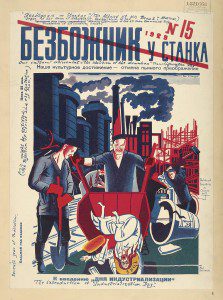Churches were torn down or converted into movie theaters or (in the case of the Lutheran church in St. Petersburg) swimming pools. Thousands of pastors were killed or consigned to the Gulags. I talked with an Estonian who told me that her son once went inside an abandoned church because he was interested in the artwork. He was warned never to do that again or he wouldn’t be allowed to go to university.
But 25 years ago, Communism collapsed in Russia and Eastern Europe. Now those regions are arguably more religious than most of the countries of Western Europe.
A study by Pew Research shows the massive failure of Soviet atheism. In the 18 former-Communist countries surveyed, 86% of the population believe in God.
And yet the temporary loss of a religious history shows. Most citizens associate religious belief with national identity. And they aren’t necessarily going to church all that much.
Catholics go to church more than the Orthodox. But the Orthodox are more conservative morally when it comes to issues like homosexuality.
The Pew study describes religion in the former Communist states as “believing and belonging, without behaving.”
Read about the findings after the jump.
From Jeremy Weber, Pew: Here’s How Badly Soviet Atheism Failed in Europe | Gleanings | ChristianityToday.com:
“The comeback of religion in a region once dominated by atheist regimes is striking,” states Pew in its latest report. Today, only 14 percent of the region’s population identify as atheists, agnostics, or “nones.” By comparison, 57 percent identify as Orthodox, and another 18 percent as Catholics.
In a massive study based on face-to-face interviews with 25,000 adults in 18 countries, Pew examined how national and religious identities have converged over the decades in Central and Eastern Europe. The result is one of the most thorough accountings of what Orthodox Christians (and their neighbors) believe and do. . . .
Across countries, solid majorities say that in order to belong, one must identify with the majority religion. For example, most say being Orthodox is essential to truly being Russian or Greek, while being Catholic is essential to truly being Polish. The close connection between religious and national identity is stronger for Orthodox than for Catholics (regional medians: 70% vs. 57%)
However, observance is a different matter. “Relatively few Orthodox or Catholic adults in Central and Eastern Europe say they regularly attend worship services, pray often, or consider religion central to their lives,” Pew researchers stated.
Catholics are twice as observant as Orthodox when it comes to weekly church attendance (medians: 25% vs. 10%). “In addition, Catholics in Central and Eastern Europe are much more likely than Orthodox Christians to say they engage in religious practices such as taking communion and fasting during Lent,” Pew researchers stated. “Catholics also are somewhat more likely than Orthodox Christians to say they frequently share their views on God with others, and to say they read or listen to scripture outside of religious services.”
Across the 18 countries, medians of 86 percent believe in God, 59 percent believe in heaven, and 54 percent believe in hell. Half also believe in fate, as well as the existence of the soul. Fewer than half pray daily.
Catholic-majority countries are more observant, but Orthodox-majority countries are more conservative on homosexuality and other social issues.
[Keep reading. . .]
For the Pew study, go here.
Propaganda drawing of Communist workers dumping icons into the garbage by Staff of Bezbozhnik (1929 issue of Bezbozhnik, via NYPL) [Public domain], via Wikimedia Commons
 The Soviet Union and its satellites in Eastern Europe strongly enforced the atheism mandated by Communist ideology. They promoted atheism by laws, education, and brutal persecution of religious believers. Schools taught required courses in atheism.
The Soviet Union and its satellites in Eastern Europe strongly enforced the atheism mandated by Communist ideology. They promoted atheism by laws, education, and brutal persecution of religious believers. Schools taught required courses in atheism.















